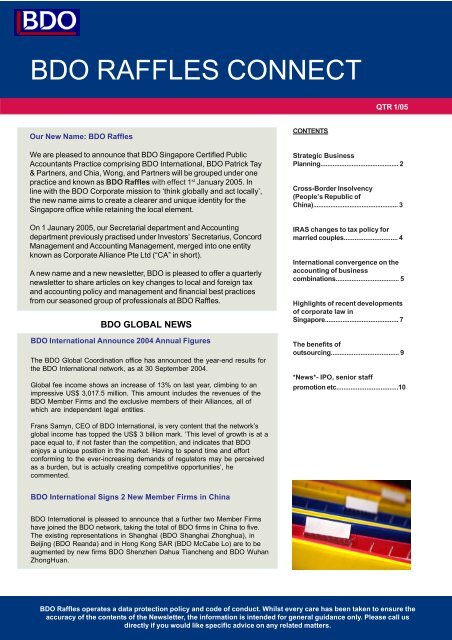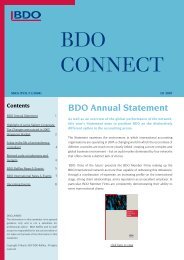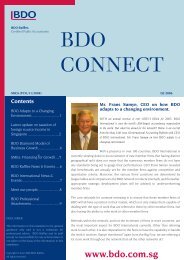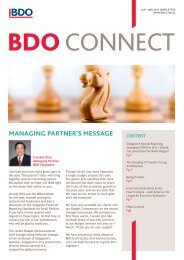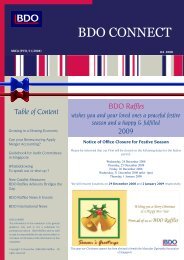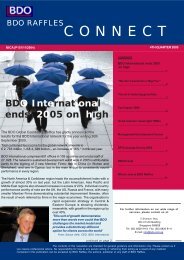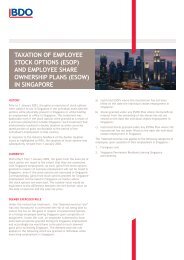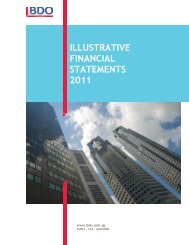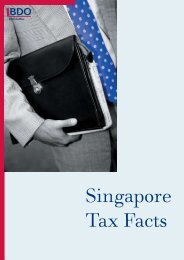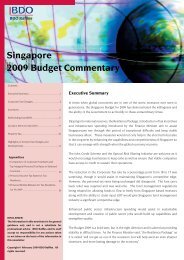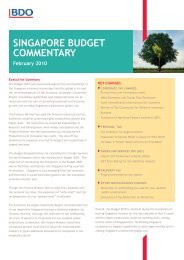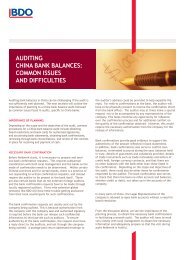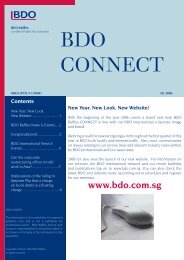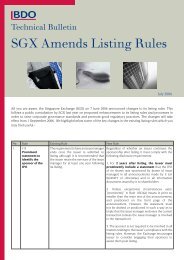Draft BDO Raffles Newsletter April 2005.pmd
Draft BDO Raffles Newsletter April 2005.pmd
Draft BDO Raffles Newsletter April 2005.pmd
You also want an ePaper? Increase the reach of your titles
YUMPU automatically turns print PDFs into web optimized ePapers that Google loves.
<strong>BDO</strong> RAFFLES CONNECTCROSS BORDER INSOLVENCY -The People’s Republic of ChinaIntroductionWith the economic reform measures implementedby the Chinese government before the twenty firstcentury, many local companies have set upbusinesses in China, with much encouragementfrom the Singapore government. Indeed, theChinese market is huge comparatively to the othercountries within the region and the opportunitiesthere are remarkable.However, for various reasons like the competitiveeconomic climate in China and its distinctivebusiness culture, not many local companies areable to sustain its businesses there and /or havefaced difficulties in recovering their investmentsthus leading to insolvency. Critical questions thatneed answering BEFORE venturing into China are:what is the insolvency practice in China?how are we, as creditors, protected or cansuch risks be minimized if our debtors defaultin payments?Under general lawCross-border insolvency procedures to beexecuted in China shall generally comply with anumber of general principles. Under theConstitution of the People’s Republic of China,Articles 18 and 32, any foreign enterprise,economic organization and individual shall abideby the Chinese laws, and their lawful rights andinterests shall be protected under Chinese lawsand jurisdiction.Chinese laws recognize international conventionsand bilateral or multilateral treaties. China mayoffer or provide judicial assistance andcooperation to those countries that haveparticipated in the conventions and treaties basedon reciprocity.China’s general attitude towards recognition andenforcement of foreign court judgment is asfollows:Based on international treaties and bilateralagreements joined by China or on reciprocity.Chinese courts may not recognize nor executeforeign court judgments and rulings in thosecases over which Chinese courts havejurisdiction, for example, Hong Kong.After being recognized or executed byChinese courts, foreign court judgments andrulings may have equal effect with the Chinesecourt decisions.Assisting legislationThe Chinese bankruptcy law system iscomplicated and is composed of the BankruptcyLaw for State Owned Enterprises, bankruptcyprocedures non-state owned enterprises,bankruptcy policies made by the centralgovernment and a series of local bankruptcyregulations. There have been no specificstipulations for international insolvency. Crossborder insolvency may generally apply the CivilProcedure Law and stipulations provided by theinternational treaties and bilateral judicialassistance agreements joined in by China.The Civil Procedure Law and relevant bilateraljudicial assistance agreements have madeseveral stipulations provided for the procedure ofrecognition and execution of foreign court rulings.Foreign court judgments may be recognized andexecuted by the Chinese courts if the followingconditions are met:According to China law, the court that made thejudgment shall have the jurisdiction over thecase;According to the law of the country in which thejudgment was made the judgment becomeeffective;The lawful rights and interests of the litigantshave been and are duly protected;Chinese courts have already arrived at alegally effective judgment on a case with thesame litigants and the identical object ofaction; or the case is already heard by theChinese courts; or the Chinese courts haverecognized the judgment of a court (legallyeffective) of a third country;The judgment is in conformity with theprinciples of Chinese law and does not impairthe Chinese sovereignty and security nor theChinese social and public interest.Insolvency practiceIn the absence of any judicial assistanceagreement between China and the foreign country,the Chinese courts’ usual practice will permit theadministrator to bring an action directly to theChinese courts provided the foreign administratorand the insolvent accept the jurisdiction of Chinesecourts. A foreign creditor requesting to seizeproperty located in China may be allowed, afternegotiation and mediation to realize his rights onhis foreign debtor’s property in China by way ofshare transfer.Article contributed by Clara Teu of our Business Recovery and Restructuring DepartmentTel: 6828 9159 Fax: 6828 9111 Email: clarateu@bdo.com.sg3
<strong>BDO</strong> RAFFLES CONNECTIRAS Circular On Change To Assess The Income Of A HusbandAnd Wife As Separate IndividualsObjectiveIn line with the government’s objective tocontinuously streamline rules and regulations,IRAS has reviewed the way married couples arebeing assessed and decided to adopt the separateassessment basis instead of the current combinedassessment basis. With effect from year ofassessment (YA) 2005, the income of a husbandand wife will be assessed as separate individuals,i.e. separate assessment will be used as thedefault mode of assessment under the Income TaxAct instead of the wife having to elect for separateassessment previously.Rationale for the Tax ChangesSocial changesToday, the social context in Singapore haschanged. More married woman are working anddual income families are also becoming the norm.Our current tax system does not reflect such shiftsin our society and hence needs to be updated.Service to taxpayersBrief Description of the Tax Changes andImplementation ProceduresUnder the new policy, a married man will beallowed to claim the full amount of wife relief of$2,000 as long as his wife’s incomechargeable in her own name is not more than$2,000 in the preceding year for that Year ofAssessment.The allowance of transfer of qualifyingdeductions between spouses who areseparately assessed.Any qualifying deductions should first beset off against the assessable income ofthe taxpayer whose activities gave riseto the deductions. Any excess can thenbe transferred to the spouse in the orderof capital allowance, trade loss followedby donations. The transferee must haveassessable income available before thetransfer can be allowed. The amountavailable for transfer is restricted to theassessable income of the transferee.The allowance of transfer of rental deficitof one spouse to be set off strictly againstthe rental income of the other spouse.As the combined assessments would generallyattract a higher marginal tax rate and to eliminatethe need for married women to elect for separateassessment yearly, the combined assessmentbasis would no longer be the default mode ofassessment for married couples with effect from YA2005.With effect from the Year of Assessment2005, a married woman would be sent anincome tax return separately from herhusband. She would be required todeclare her income and claim fordeductions, and be assessed separatelythereon.For the transfer to take place, an electionhas to be made by both spouses. Theelection for the transfer is to be made byboth spouses on a year-to-year basis.The election is not made at the time ofsubmission of Returns but has to be madebefore the end of 30 days from the dateof notice of assessment of the individualor his spouse, whichever is the later.The election once made is irrevocable.Article contributed by Simon Poh of our Tax DepartmentTel: 6828-9182 Fax: 6828-9111 Email: simonpoh@bdo.com.sg4
<strong>BDO</strong> RAFFLES CONNECTFRS 103, Revised FRS 36 and Revised FRS 38:International Convergence On The Accounting Of Business CombinationsIntroductionThe Singapore Council on Corporate Disclosureand Governance (“CCDG”) issued the new FRS103 Business Combinations and theconsequential revised FRS 36 Impairment ofAssets and FRS 38 Intangible Assets on 1 July2004 to be effective for financial periods beginningon or after 1 July 2004.The new FRS 103, which replaces FRS 22Business Combinations, is CCDG’s adoption ofInternational Financial Reporting Standards 103(“IFRS 103”) Business Combinations publishedby the International Accounting Standards Board(“IASB”) in March 2004, which seeks to align theIFRS to US GAAP.Early adoption or retrospective application of thisstandard is permitted only if the necessaryconditions are met which include the requirementfor entities to have had access, at the time of eachacquisition, to the fair value information foracquired identifiable assets, liabilities andcontingent liabilities. The revised FRS 36 and 38will also have to be applied retrospectively fromthe same date as FRS 103.Management will need a thorough understandingof this new standard as it potentially hassignificant implications on the financial reportingof an entity’s merger and acquisition.This article provides an overview of the scope andmajor requirements of the new FRS 103 andamendments to FRS 36 and FRS 38.Scope and definitions of FRS 103FRS 103 applies when an entity enters into abusiness combination, i.e. when separate entitiesor businesses are brought together into areporting entity. However, FRS 103 excludes fromits scope business combinations under commoncontrol as well as those formed by contract alonewithout an ownership interest by the reportingentity.Major requirementsThe uniting of interests method previously allowedunder FRS 22 when it was not possible to identifyan acquirer is no longer allowed under FRS 103.Now, only the purchase method of accounting canbe used for all business combinations within thescope of FRS 103.An acquirer will therefore have to be identified forall business combinations and the fair value of allthe acquiree’s identifiable assets, liabilities andcontingent liabilities will have to be determined.The measurement for the costs of businesscombinations remains unchanged from FRS 22.Acknowledging the difficulties in identifying anacquirer for some business combinationtransactions, indicators are provided by FRS 103as guidance to assist in the identification process.Detailed guidance on reverse acquisitions is alsonow provided in FRS 103.The benchmark treatment in FRS 22 in measuringthe minority’s share of its identifiable assets andliabilities at the book value is now prohibited, asFRS 103 requires the minority interests in theacquiree to be stated at the minority’s share of thenet fair value of the acquiree’s identifiable assets,liabilities and contingent liabilities determined.Even though FRS 22 requires the intangibleassets acquired in a business combination to beseparately recognised from goodwill, in practice,these intangible assets have always largely beensubsumed in goodwill on the basis that theseparability and identifiability criteria are difficult tomeet. The new FRS 103 now expands theidentifiability of intangible assets to those arisingfrom contractual or other legal rights, regardless ofwhether those rights are transferable or separablefrom the acquiree.Article contributed by Elsa Neoh Su Mei of our Audit DepartmentTel: 6828-9187 Fax: 6828-9111 Email: elsaneoh@bdo.com.sg5
<strong>BDO</strong> RAFFLES CONNECTFRS 103, Revised FRS 36 and Revised FRS 38:International Convergence On The Accounting Of Business Combinations (cont’d)The revised FRS 38 also clarifies that the probabilityof whether future economic benefits attributable tothe intangible assets will flow to the entity is alwaysconsidered satisfied for intangible assets acquiredin a business combination and if the intangibleasset has a finite life, then there’s a rebuttablepresumption that its fair value can be measuredreliably for it to be recognised separately fromgoodwill.FRS 103 requires a contingent liability of anacquiree to be separately recognised if its fair valuecan be measured reliably [and although suchcontingent liability is excluded from the scope ofFRS 37 Provisions, Contingent Liabilities andContingent Assets, its disclosure requirement willneed to be complied with.FRS 103 only allows restructuring costs that satisfythe recognition criteria under FRS 37 to berecognised as a liability of the acquiree as at theacquisition date.. Otherwise, provisions for futurelosses or other costs expected to be incurredbecause of a business combination will be treatedas post combination expenses.Goodwill arising from a business combination isnow prohibited from being amortised. Instead,goodwill acquired in a business combinationshould initially be recognised as an asset at costand subsequently measured at cost lessaccumulated impairment losses. The test forimpairment has to be performed annually inaccordance to FRS 36. Reversal of goodwillimpairment losses is now prohibited.Whenever an acquirer’s interest in the net fairvalue of the identifiable assets, liabilities andcontingent liabilities exceeds its cost of thebusiness combination, the acquirer is required byFRS 103 to reassess the identification andmeasurement of the acquiree’s identifiableassets, liabilities and contingent liabilities and themeasurement of its cost of the businesscombination. Any excess remaining after thesereassessments must be recognised immediatelyin the profit and loss.For entities applying these standards prospectivelyfrom annual period beginning on or after 1 July2004, the entities shall discontinue theamortisation of goodwill acquired from businesscombinations and eliminate the carrying amount ofthe accumulated amortisation with thecorresponding goodwill. Goodwill arising from abusiness combination previously recognised inequity shall not be recognised in profit and lossshould the entity dispose the business. Anynegative goodwill previously recognised shall bederecognized at the beginning of the financialperiod with a corresponding adjustment to theopening balance of retained earnings.Article contributed by Elsa Neoh Su Mei of our Audit DepartmentTel: 6828-9187 Fax: 6828-9111 Email: elsaneoh@bdo.com.sg6
<strong>BDO</strong> RAFFLES CONNECTMerger of Registry of Companies and Businessesand Public Accountants Board was completed on 1<strong>April</strong> 2004 as well as the operation of theCompanies (Amendment) Act 2004. The followingare some of the amendments reflected in the Act:-(Implementation of 2nd Phase of the CLRFC’srecommendations)1. Share Capital and Shareholders(One shareholder and one directorcompanies)All private companies incorporated inSingapore are required to have at least oneshareholder and one director who is ordinarilyresident in Singapore instead of the current 2directors requirements. A newly incorporatedprivate company can register with one directorwho is a resident in Singapore and oneshareholder [Sections 17, 20A and 145(1)]. Thesole director and the company secretary cannotbe the same person to ensure there is noconflict of interest. [Section 20A, 145(1) & 171]2. Consolidated Accounts Financial Statements(not applicable to public listed company)A company need not prepare consolidatedaccounts financial statements if it is notrequired to do so under the AccountingStandards [Section 201]The directors of a holding company are nolonger required to receive the audited accountsof each subsidiary before issuing consolidatedaccounts, they should proceed to do so onlywhen they are satisfied that each subsidiary’saccounts are properly prepared forconsolidation purposes and present a true andfair view.3. Memorandum and Articles of AssociationA private company has full capacity to carry outany business activities or enter into anytransaction with full rights, powers andprivileges. However, it may restrict suchcapacity, rights, powers or privileges in itsMemorandum or Articles of Association [Section23]4. Miscellaneous Display of name/company registration numberThe Statutory requirement for everycompany to display its name outside itsoffice has been removed [Section 144(3)]Every company to have the registrationnumber in addition to its registered nameon all business letters, statements ofaccount, invoices, official notices andpublications of or purporting to be issuedor signed by or on behalf of the companyPublication of Company Name withregistration number in certain documents[Section 144]5. Other amendmentsA company is allowed to electronicallydDistributione of statutory reports, noticesand other documents to members, officersor auditors of the company under certainspecified conditions ,etc can be done byway of electronic transmission [Section173A]Private companies are allowed to raisecapital through private and exemptedofferings without the need to convert topublic companiesCompanies are statutorily conferred withthe powers of a natural person. The ultraviresdoctrine is abolished, except inspecified circumstancesAny person can now apply to the Ministerto be an approved liquidatorCompanies are no longer required to statethe objects of a company in itsMemorandum of AssociationUp coming news!There will be two more business structures inSingapore i.e. the Limited Partnership (LP) andLimited Liability Partnership (LLP) with the intentionto provide more option available for businessesand investments. LP is similar to a generalpartnership with at least one general partner withjoint and unlimited liability, whereas, LLP offers itsmembers with limited liability but retaining theflexibility to the business operation. LLP is alsoavailable to all types of businesses likeprofessionals and businessmen.Article contributed by Lim Swe Jian of our Corporate Secretarial DepartmentTel: 6828-9139 Fax: 6828-9111 Email: cheemei@bdo.com.sg8
<strong>BDO</strong> RAFFLES CONNECTThe Benefits of OutsourcingOutsourcing can provide a number of long-termbenefits:Control capital costs. Cost-cutting may not be theonly reason to outsource, but it´s certainly a majorfactor. Outsourcing converts fixed costs intovariable costs, releases capital for investmentelsewhere in your business, and allows you toavoid large expenditures in the early stages ofyour business. Outsourcing can also make yourfirm more attractive to investors, since you´re ableto pump more capital directly into revenueproducingactivities.Increase efficiency. Companies that doeverything themselves have much higherresearch, development, marketing and distributionexpenses, all of which must be passed on tocustomers. An outside provider´s cost structureand economy of scale can give your firm animportant competitive advantage.Reduce labor costs. Hiring and training staff forshort-term or peripheral projects can be veryexpensive, and temporary employees don´t alwayslive up to your expectations. Outsourcing lets youfocus your human resources where you needthemThe Benefits of Outsourcing – A Case StudyThe ScenarioSmall organization employing 5 personnelCompany is the Support OfficeSimple Payroll and HR administrationrequirementsPayroll ServicesManpower : One Payroll ClerkSalary: S$1,500.00 per month or S$18,000.00per yearBonus/13 month: S$1,500.00Employer CPF for the Year: S$2,535.00Leave: 12 Days or equivalent of S$78.00(inclusive of Employer CPF)Medical: 21 Days or equivalent of S$136.00(inclusive of Employer CPF)Total Estimated cost of an employee per year:S$22,249.00 per annum.Outsource Payroll Services Payroll Fee S$450.00 per month orS$5,400.00 per year HR Admin S$250.00 per month orS$3,000.00 per year Other miscellaneous cost S$100.00 permonth or S$1,200.00 per yearTotal estimated cost of Outsource services peryear: S$9,600.00Total Savings per year : S$12,649.00Other benefits are: Full compliance with the CPF and Taxrequirement for employer Professional help in all aspects oforganisation’s employment needs No downtime from staff who goes onleave or on medical as the serviceprovider will ensure that there is no downtime Service provider is always on call duringoffice hoursObjections:Availability of payroll staff to assist inother office assignment if requiredFlexible in workflow due to closeproximity of the staff. Service providerrequires scheduled work flowMore bureaucratic in approval processArticle contributed by Lim Siew Ming of our Outsourcing Accounting DepartmentTel: 6828-9109 Fax: 6828-9111 Email: siewming@bdo.com.sg9
<strong>BDO</strong> RAFFLES CONNECT*Hot Off The Press!*Association of Chartered Certified Accountants -As part of <strong>BDO</strong> <strong>Raffles</strong> ongoing commitment to service quality and our staff development, we are pleased toannounce that we are the first CPA firm in Singapore to be awarded the ‘ACCA Plus - approved CPD employer’status.Initial Public OfferingsOur firm acted as the Reporting Accountants for 3 Initial Public Offerings during 2004, which raised total grossproceeds of approximately S$24 million. The companies listed were Lasseters International Holdings Limited,Advance SCT Limited and Etika International Holdings Limited.Staff PromotionsThe Partners of <strong>BDO</strong> <strong>Raffles</strong> are pleased to announce the following promotions with effect from 1 January 2005:D e p a r t m e n t N a m e : Prom oted to:Audit Jocelyn G oh M anagerBusiness R ecovery& R estructuringC lara TeuG ary LohM anagerM anagerOur Annual Dinner & Dance 2004The three lovely winners of our ‘best dressed’competition.Mr Chia, Managing Partner, delivering the goodnews of the firm’s performance over 2004, yetstill stressing the need for 110% commitmentto providing high levels of service to our valuedclients.10
For more information about our various set of services, please contact the following:Audit Department Peter Leong peterleong@bdo.com.sgBusiness Recovery & Restructuring Lua Aun Wee aunwee@bdo.com.sgBusiness Risk Management Angela Sin angelasin@bdo.com.sgBusiness Transaction Services Ross Limjoco rosslimjoco@bdo.com.sgCorporate Secretarial Lim Swe Jian swejian@bdo.com.sgManagement Consulting Tah Wee Han weehan@bdo.com.sgOutsourcing Accounting Lim Siew Ming siewming@bdo.com.sgTax Advisory Simon Poh simonpoh@bdo.com.sgYou can let us know by email what you would like to see in the future. Click on the link below, andget your pen or keyboard going. Send your feedback to Richard Thomas atnewsletter@bdo.com.sgwww.bdo.com.sgYou can find us at:<strong>BDO</strong> RAFFLES5 Shenton Way#07-01 UIC BuildingSingapore 068808Tel: (65) 6828 9118Fax: (65) 6828 9111Email: info@bdo.com.sgWebsite: http://www.bdo.com.sg<strong>BDO</strong> International is a world wide network of public accounting firms, called <strong>BDO</strong> Member Firms,serving international clients. Each <strong>BDO</strong> Member Firm is an independent legal entity in its own country. Thecombined total fee income of all <strong>BDO</strong> Member Firms was US$ 3 billion in 2004. The global network currentlyhas 621 offices in 105 countries, and some 25,118 partners and staff in the Member Firms providebusiness advisory services throughout the world.<strong>BDO</strong> <strong>Raffles</strong> operates a data protection policy and code of conduct. Whilst every care has been taken to ensure theaccuracy of the contents of the <strong>Newsletter</strong>, the information is intended for general guidance only. Please call usdirectly if you would like specific advice on any related matters.


